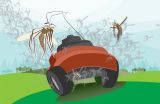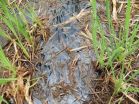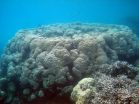(Press-News.org) CHAMPAIGN, Ill. -- A study of the West Nile virus risk associated with "dry" water-detention basins in Central Illinois took an unexpected turn when land managers started mowing the basins. The mowing of wetland plants in basins that failed to drain properly led to a boom in populations of Culex pipiens mosquitoes, which can carry and transmit the deadly virus, researchers report.
A paper describing their findings is in press in the journal Ecological Applications.
The team, led by University of Illinois postdoctoral researcher Andrew Mackay, found that mowing down cattails and phragmites, two invasive plants that tend to permeate stormwater basins, adds a lot of plant debris to the water.
"We suspect bacteria quickly colonize the waterborne debris, and mosquito larvae feed on the bacteria," said Illinois entomology professor Brian Allan, a co-author on the study with Mackay, Illinois Natural History Survey entomologist Ephantus Muturi and U. of I. natural resources and environmental sciences professor Michael Ward.
"After aquatic plants were mowed in the basins, we saw a large increase in the number of Culex pipiens mosquito larvae in the basins, which had relatively few before mowing," Mackay said. "And perhaps more importantly, we caught about twice as many adult Culex mosquitoes in traps at basins after these plants were mowed, compared with basins where the aquatic vegetation was left intact."
Mowing phragmites, a tall and sturdy invasive grass, also dispersed a host of bird species that liked to roost in the grass, Allan said.
"We had observed that these phragmites-invaded basins would become colonized by large communal roosts of birds," he said. "And we thought that was important because birds are the natural reservoir hosts of West Nile Virus."
The researchers suspected that a bird roost near a mosquito nursery might increase the West Nile virus risk to people living nearby.
"Instead, we found that the presence of a communal bird roost actually decreased West Nile virus risk," Allan said. "That may be because these wetland roosts include a variety of bird species, many of which are not good reservoirs of the virus. They don't amplify the virus like other bird species more associated with residential areas do - the American robin, for example.
"We measured mosquito abundance, and we measured West Nile virus prevalence in the mosquitoes we collected in this field study, and we were able to show that it's these mowed areas where you actually get the highest West Nile virus risk to people in the surrounding landscape," Allan said.
"You might think you're helping by mowing, but you're creating another problem," Muturi said. "It's all a matter of good planning and coordination to be sure that the kind of activities we do, either for aesthetic or for any other reason, don't increase public health risk."
INFORMATION:
The INHS is a division of the Prairie Research Institute at the U. of I.
The U. of I. School of Integrative Biology; the Institute for Sustainability, Energy and the Environment; and the Illinois Used Tire Management Fund supported this research.
Editor's notes:
To reach Brian Allan, call 217-244-1341; email ballan@illinois.edu.
To reach Ephantus Muturi, email emuturi2@illinois.edu.
The paper, "Invasive aquatic macrophytes in urban stormwater habitats and West Nile virus transmission risk," is available online or from the U. of I. News Bureau.
GeoSpace
Warmer air, less sea ice lead to mercury decline in Arctic Ocean
The amount of mercury in the Arctic Ocean is declining as the region rapidly warms and loses sea ice, according to a new study. A new study in Geophysical Research Letters suggests that fish, marine mammals, polar bears, whales and humans in the Arctic might potentially be consuming lower amounts of toxic methylmercury as the region warms.
Eos.org
Puzzles invite you to explore Earth with interactive imagery
The EarthQuiz challenge can take you to virtual field locations with just the click of ...
The Mississippi River delta is a rich ecosystem of barrier islands, estuaries, and wetlands that's home to a diverse mix of wildlife -- as well as more than 2 million people. Over the past few decades, the shape of the delta has changed significantly, as ocean waves have carved away at the coastline, submerging and shrinking habitats.
To keep flooding at bay, engineers have erected dams and levees along the river. However, it's unclear how such protective measures will affect the shape of the river delta, and its communities, over time.
Now researchers from MIT and ...
MELBOURNE, FLA. -- The coral reefs that have protected Pacific Islanders from storm waves for thousands of years could grow rapidly enough to keep up with escalating sea levels if ocean temperatures do not rise too quickly, according to a new study from Florida Institute of Technology.
The study, published Wednesday in the journal Royal Society Open Science, provides the first evidence that well-managed reefs will be able to keep up with sea-level rise through vertical growth. But that can happen only if carbon dioxide levels in the atmosphere stay below 670 parts-per ...
PITTSBURGH, July 22, 2015 - Late- and post-menopausal women have significantly greater volumes of fat around their hearts - a risk factor for heart disease - than their pre-menopausal counterparts, a University of Pittsburgh Graduate School of Public Health study has shown for the first time.
The finding, published online and scheduled for the Sept. 1 issue of The Journal of Clinical Endocrinology & Metabolism, likely can be attributed to changing hormone levels and could guide potentially life-saving interventions. The work was funded by the National Institutes of Health ...
Electronic cigarettes or "e-cigs" have been touted as a tool smokers can use to wean themselves off of traditional cigarettes, which many believe are more harmful than their "e" counterparts. But because e-cig liquid also contains nicotine and emits carcinogens, is that perception really true? One team now reports in the ACS journal Chemical Research in Toxicology that much of the nicotine in e-cigarettes is the addictive form of the compound.
Although e-cigs don't burn tobacco, they heat and vaporize a liquid that contains nicotine, flavorings and other substances. ...
Stem cells hold great potential for addressing a variety of conditions from spinal cord injuries to cancer, but they can be difficult to control. Scientists are now reporting in the journal ACS Nano a new way to mimic the body's natural approach to programming these cells. Using this method, they successfully directed adult stem cells to turn specifically into muscle, which could potentially help treat patients with muscular dystrophy.
In the 1990s, scientists first isolated human embryonic stem cells, which can turn into any kind of cell in the body, and the promise ...
A guideline--recommendations on diagnosing and treating a particular disorder--aims to present the best possible treatment for patients. However, when guidelines are compiled their authors often have conflicts of interest, for example as a result of funding or membership in specialist societies that are in close contact with industry. In a recent original article in Deutsches Ärzteblatt International (Dtsch Arztebl Int 2015; 112: 445-51), Gisela Schott et al. determine that most guideline authors do declare their conflicts of interest. However, this rarely has consequences ...
Automakers are looking for ways to improve their fleets' average fuel efficiency, and scientists may have a new way to help them. In a report in the journal ACS Applied Materials & Interfaces, one team reports the development of a material that could convert engine heat that's otherwise wasted into electrical energy to help keep a car running -- and reduce the need for fuels. It could also have applications in aerospace, manufacturing and other sectors.
In 2012, the Obama administration announced fuel-efficiency standards that would require U.S. vehicles to average 54.5 ...
Lithium-ion batteries remain the technology-of-choice for today's crop of electric cars, but challengers are revving up to try to upset the current order. An article in Chemical & Engineering News (C&EN), the weekly newsmagazine of the American Chemical Society, takes a look at two of the top contenders vying to erode lithium-ion's dominance.
Alex Scott, a senior editor at C&EN, reports on two developments from companies in England that seem poised to compete in the electric car battery market within the next two to four years. One is a sodium-ion version, produced by ...
If you experience a major heart attack the damage could cost you around five billion heart cells. Future stem cell treatments will require this number and more to ensure those cells are replaced and improve your chances of survival.
Experts at The University of Nottingham have discovered the first fully synthetic substrate with potential to grow billions of stem cells. The research, published in the academic journal Advanced Materials, could forge the way for the creation of 'stem cell factories' - the mass production of human embryonic (pluripotent) stem cells.
The ...




